-
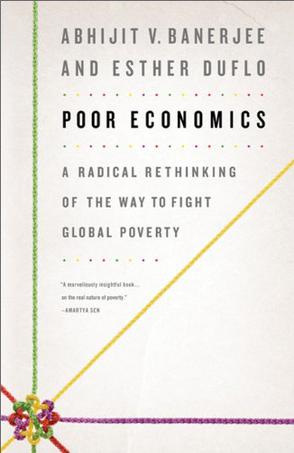
Poor Economics
Billions of government dollars, and thousands of charitable organizations and NGOs, are dedicated to helping the world's poor. But much of their work is based on assumptions that are untested generalizations at best, harmful misperceptions at worst. Abhijit Banerjee and Esther Duflo have pioneered the use of randomized control trials in development economics. Work based on these principles, supervised by the Poverty Action Lab, is being carried out in dozens of countries. Drawing on this and their 15 years of research from Chile to India, Kenya to Indonesia, they have identified wholly new aspects of the behavior of poor people, their needs, and the way that aid or financial investment can affect their lives. Their work defies certain presumptions: that microfinance is a cure-all, that schooling equals learning, that poverty at the level of 99 cents a day is just a more extreme version of the experience any of us have when our income falls uncomfortably low. This important book illuminates how the poor live, and offers all of us an opportunity to think of a world beyond poverty. -
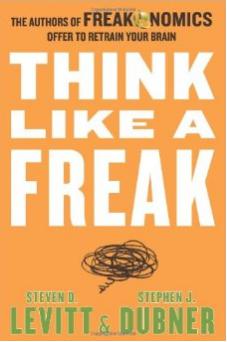
Think Like a Freak
Now, with Think Like a Freak, Steven D. Levitt and Stephen J. Dubner have written their most revolutionary book yet. With their trademark blend of captivating storytelling and unconventional analysis, they take us inside their thought process and teach us all to think a bit more productively, more creatively, more rationally—to think, that is, like a Freak. Levitt and Dubner offer a blueprint for an entirely new way to solve problems, whether your interest lies in minor lifehacks or major global reforms. As always, no topic is off-limits. They range from business to philanthropy to sports to politics, all with the goal of retraining your brain. Along the way, you’ll learn the secrets of a Japanese hot-dog-eating champion, the reason an Australian doctor swallowed a batch of dangerous bacteria, and why Nigerian e-mail scammers make a point of saying they’re from Nigeria. Some of the steps toward thinking like a Freak: First, put away your moral compass—because it’s hard to see a problem clearly if you’ve already decided what to do about it. Learn to say “I don’t know”—for until you can admit what you don’t yet know, it’s virtually impossible to learn what you need to. Think like a child—because you’ll come up with better ideas and ask better questions. Take a master class in incentives—because for better or worse, incentives rule our world. Learn to persuade people who don’t want to be persuaded—because being right is rarely enough to carry the day. Learn to appreciate the upside of quitting—because you can’t solve tomorrow’s problem if you aren’t willing to abandon today’s dud. #该内容由淘宝网-乐读书屋提供#http://l-books.taobao.com/ -
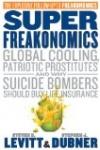
Super Freakonomics
The New York Times best-selling Freakonomics was a worldwide sensation, selling over four million copies in thirty-five languages and changing the way we look at the world. Now, Steven D. Levitt and Stephen J. Dubner return with SuperFreakonomics, and fans and newcomers alike will find that the freakquel is even bolder, funnier, and more surprising than the first. Four years in the making, SuperFreakonomics asks not only the tough questions, but the unexpected ones: What's more dangerous, driving drunk or walking drunk? Why is chemotherapy prescribed so often if it's so ineffective? Can a sex change boost your salary? SuperFreakonomics challenges the way we think all over again, exploring the hidden side of everything with such questions as: How is a street prostitute like a department-store Santa? Why are doctors so bad at washing their hands? How much good do car seats do? What's the best way to catch a terrorist? Did TV cause a rise in crime? What do hurricanes, heart attacks, and highway deaths have in common? Are people hard-wired for altruism or selfishness? Can eating kangaroo save the planet? Which adds more value: a pimp or a Realtor? Levitt and Dubner mix smart thinking and great storytelling like no one else, whether investigating a solution to global warming or explaining why the price of oral sex has fallen so drastically. By examining how people respond to incentives, they show the world for what it really is – good, bad, ugly, and, in the final analysis, super freaky. Freakonomics has been imitated many times over – but only now, with SuperFreakonomics, has it met its match. -
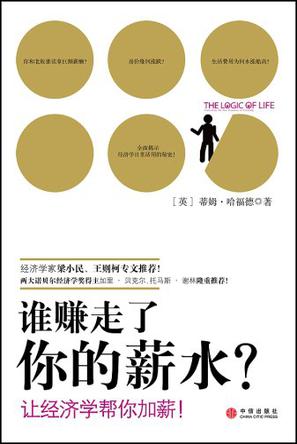
谁赚走了你的薪水
《谁赚走了你的薪水》(The Logic of Life)老板是笨蛋,无所事事却拿高薪,经济学家帮你看透薪水的秘密!曼哈顿的待嫁女总比光棍男多,可是她们却不肯去男人成堆的阿拉斯加,这里有什么奇怪的逻辑?房价缘何上涨?生活费用为何水涨船高?你和老板谁该拿巨额薪酬?经济学家帮你跑赢CPI! 世界是个不公平的地方,对吗?世界是个不讲道理的地方,对吗?老板收入高得那么离谱,他付出的辛苦那么少,而你象耕牛一样辛勤地工作却只得一点点的报酬,这有道理可讲吗?为什么你的爱情那么不圆满,打牌老输钱?为什么你只能望着房价飚升叹为观止?望着物价上涨望洋兴叹?这个世界,30秒的广告播了25秒还不知道卖的是什么、大城市的女人嫁出去越来越难、雇主招聘总戴有色眼镜、离婚还存在最佳比率……一切看起来太混乱! 《谁赚走了你的薪水》偏偏告诉你:所有现象背后都有合理的逻辑。如果你愤怒,那就让怒火燃烧吧,哈福德热爱这愤怒。他从未说过世界是公平的,这个世界仅仅是符合逻辑的。或许只有在阴谋家和象哈福德这样的经济学家眼中,世界才是讲得通的! 这是一本全新的经济学,不仅有趣而且十分刺激。 不信你就看看。 -
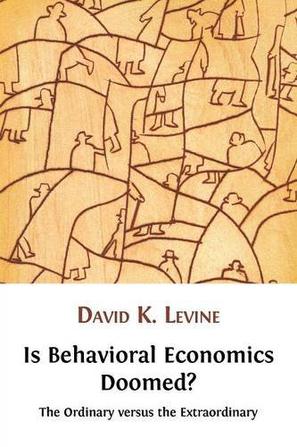
Is Behavioral Economics Doomed?
-
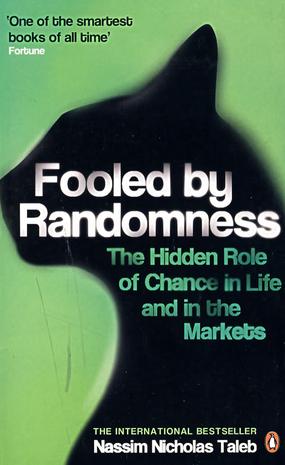
Fooled by Randomness
《财富》评选的75本商务人士必读书之一。股市的大起大落只发生在须臾之间,借鉴塔勒布的操作手法(这也是不少操盘手正在做的),您将能避免风险,并在黑天鹅出现时大赚一笔。说股票交易者应该人手一册本书绝对不过分。 人的本性经常低估随机现象,我们很需要这样的书。妙趣横生、清新隽永且独具一格,令人玩味无穷。——罗伯特·希勒(畅销书《非理性繁荣》作者) 本书常识性知识俯拾即是。如果你是交易员、科学家,或者哈佛律师,本书必读。——保罗·威尔莫特(《衍生性金融商品》作者) 简单一句话:这本书让人看得入迷。埋首其中,你对生命(以及你的钱财)的了解将大为增进,这可不是随机性的结果。——伯恩斯坦(彼得·伯恩斯坦公司总裁) 当还是股市中的一位菜鸟级别的交易员时,作者塔勒布曾成功地在一次股灾中得以幸免,他潜心半年研究这场风暴,认为他的逃脱不是有比其他人高明之处,完全是运气好——运气在金融市场中起着重要的作用,但是人们却总是过低地估计了随机作用,忍不住想对事物做出自己的解释,这就形成了种种迷信。由此他写作了这样一部关于运气——随机性的书。 塔勒布指出:在基因上,我们仍和未开化的土著人很接近。我们的信念的形成,充满着迷信──即使现今也不例外(或许必须说,尤以今天为甚)。某一天,原始部落的某个人抓了鼻子之后不久,雨开始下了,于是他煞费苦心发展出一套抓鼻子祈雨的方法。同样的,我们会把经济的繁荣归功于联邦储备委员会降低利率;或者一家公司经营成功,竟和新总裁“走马上任”有关。类似风马牛不相及的事件屡屡被我们扯上联系,并导致我们在人生的重要抉择关头步步踏错,先机尽失。 生活中随机性无处不在,即使是专业的数学家,并精于概率的计算,也往往会被随机性所捉弄,塔勒布最后建言:我们虽然无法避免随机性,但我们可以学着接受它。塔勒布的理念已经自成一派,世界上相当多的股票交易员都承认受到他理念的影响——从稀有事件中获取收益。这绝对是每一位证券交易者都应该珍藏的一本书! Everyone wants to succeed in life. But what causes some of us to be more successful than others? Is it really down to skill and strategy – or something altogether more unpredictable? This book is the word-of-mouth sensation that will change the way you think about business and the world. It is all about luck: more precisely, how we perceive luck in our personal and professional experiences. Nowhere is this more obvious than in the markets; we hear an entrepreneur has ‘vision; or a trader is talented;, but all too often their performance is down to chance rather than skill. It is only because we fail to understand probability that we continue to believe events are non-random, finding reasons where none exist. This irreverent bestseller has shattered the illusions of people around the world by teaching them how to recognize randomness. Now it can do the same for you.